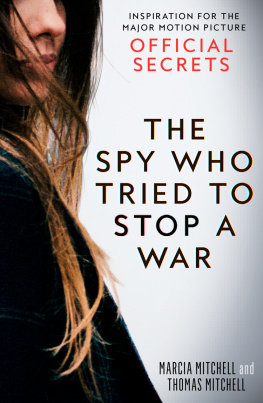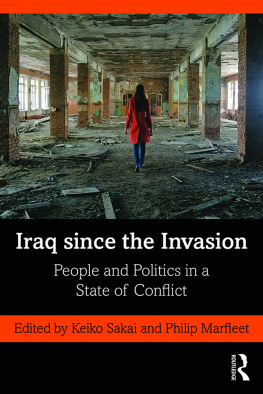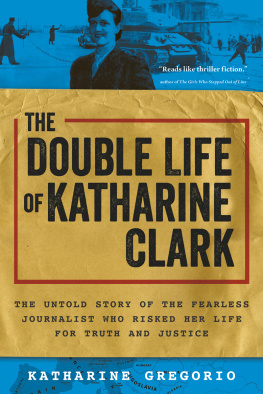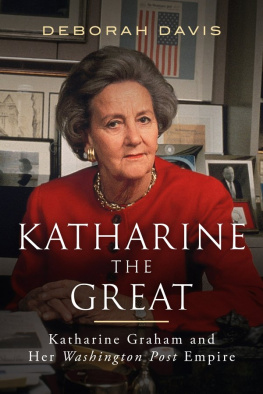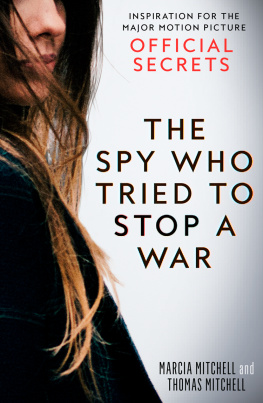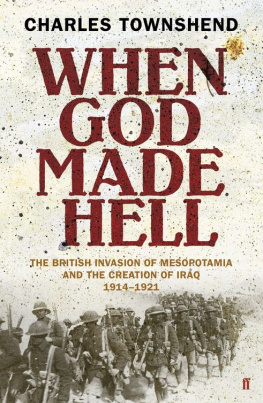CONTENTS
Contents
Guide
THE SPY WHO TRIED TO STOP A WAR
Katharine Gun and the Secret Plot to Sanction the Iraq Invasion
Marcia and Thomas Mitchell

For daughter Kristin and sons Alan and Jay, and for their
loved ones which makes them ours as well
And for Paul and Jan Harwood,
Katharines remarkable parents
It was a decision of conscience in a world where nobody celebrates that. She will go down in history as a hero of the human spirit.
SEAN PENN
We are going to be in a very dangerous situation as a country if people feel they can simply spill out secrets or details of security operations, whether false or true actually, and get away with it.
TONY BLAIR
T HE AUTHORS ARE grateful to a number of fine people whose wisdom and support were invaluable in researching and writing this book.
In the United Kingdom: Katharine and Yasar Gun, who told their story well and without violating restrictions imposed by the Official Secrets Act; James Welch, brilliant Liberty solicitor; Martin Bright, political editor of the New Statesman and former courageous home affairs editor of the Observer; the Right Honourable Clare Short, member of Parliament and former Blair cabinet minister, who spoke with fire and conviction; Elizabeth Wilmshurst, former Foreign Office deputy legal adviser and respected international law expert; two special people from the intelligence community Glenmore Trenear-Harvey, intelligence analyst, and Nigel West, noted writer and former member of Parliament; gracious Paul and Jan Harwood; crusading journalist Yvonne Ridley; and Ava Astaire and Richard McKenzie, who made their London home our own.
In the United States and Canada: The erudite Honorable Edward Bayda, retired Chief Justice, Saskatchewan; Norman Solomon, noted journalist and author, whose support has been invaluable; Daniel Ellsberg, whistle-blower icon; Ray McGovern, veteran intelligence analyst and former CIA officer; Sean Penn, actorpeace activist; Marsha Coleman-Adebayo, whistle-blower and dedicated activist; Robert Lutz, highly successful corporate executive and former Marine attack pilot; Dr Peter O. Whitmer, author, clinical psychologist, keen observer of human behaviour; Patricia Lebrun, educator and fine reviewer; Lorraine and Judd Horbaly, supporters and organizers of a focus group to review the partial manuscript; Peggy Adler, energetic supporter, organizer, and intelligence researcher; Mary Yost, agent and friend.
In getting the manuscript ready for publication, thanks go to Tom Killingbeck and Eleanor Bishop at HarperCollins; and Benjamin Arden and Richard Huffman for legal support. This Second Edition was inspired by the making of Official Secrets, the feature film made from this volume. The production team included producers Ged Doherty and Elizabeth Fowler, director Gavin Hood, screenwriters Gregory Bernstein and Sara Bernstein, and distributors EntertainmentOne and IFC. The First Edition was published with PoliPoint Press: Scott Jordan, Peter Richardson, Melissa Edeburn; BookMatters, Dave Peattie; and masterful copyeditor Edith Gladstone.
Close to home, which makes them last but certainly not least, Kristin Donnan, ever faithful and dedicated editor and agent of her mothers work; Lynn Eyermann, invaluable in First Edition support; and Judy Duhamel and Ann Thompson, for reasons they know.
Marcia and Tom Mitchell, 20 February 2008 (with additions by Marcia, exactly eleven years later)
The implication is that the intelligence threat from the United States is also rising by the day.
From a January 2008 Chinese intelligence analysis
There is no longer a realistic prospect of a conviction in this [the Pasquill OSA] case.
Crown Prosecutor Mark Ellison
T HE MORE THINGS change
In January 2008, exactly four years after Frank Koza e-mailed GCHQ, there were indications despite warnings and lessons of universal import that some things were impervious to change. This, regardless of a horrendous and controversial war, reorganization after reorganization of the often contentious and competing US intelligence entities and agencies, and promises of adherence to international accords. In the United Kingdom, although Tony Blair had been replaced by Gordon Brown, there was continued serious grumbling about Iraq and concomitant concern about US influence, further revelations about government hanky-panky, and the same old battles over the inefficacy of the Official Secrets Act.
Just two pithy examples, happenings reported within days of each other on the fourth anniversary of the NSA misadventure:
In China, the government-controlled media reported an intelligence experts complaint that the US National Security Agency was spying on his countrys electronic communications. The expert was reacting in kind. An American media report had claimed that Chinese intelligence penetrated the NSAs Kunia listening post in Hawaii through a translation service. Mandarin translators, like Katharine Gun during her days at GCHQ in Cheltenham, do this sort of thing daily, sharing with the NSA. The spy in the sky game continues, and it would be ridiculously nave to suggest it does not or should not.
Further, the Chinese were not happy about what was happening in Kunia, observing that the Hawaiian listening post was steadily growing in size and power.
Also in January 2008, a London Foreign Office civil servant starred in a high drama at the Old Bailey that had tongues wagging about a re-enactment of the Katharine Gun case. The prosecutor replaying his earlier role was Mark Ellison, in charge as the Crown lost yet another high-profile OSA case. Charges against Derek Pasquill were suddenly dropped when it came to light that even his own senior officers had claimed his leaking Whitehall documents did no harm. Included in the leak was information about US secret transport of terror suspects to foreign countries where they could be tortured.
It was rumoured that the case was dropped because to continue would have caused the UK government serious embarrassment. Of course, this was said about the failed case against Katharine, where the embarrassment would have been far greater. In both, the reason given was failure of a realistic chance of conviction. As for US embarrassment, the American public already knew of the practice of extraordinary rendition because of leaked documents.
Whistle-blower David Shayler, furious about his failure to get charges against him dropped and the fact that he served six months in prison, told the world that the reason the OSA charges prevailed against him was because dropping the charges would have caused political humiliation for the government. This was no way to mete out justice, steamed Shayler.
And then the Observer called for reform of the Official Secrets Act. So, why was what began on 31 January 2003 at Americas National Security Agency so very important at the time and why is it still important?
Most significantly, much of the world learned then (and afterwards, in America) how and why the ill-conceived spy operation helped kill a UN Security Council resolution legitimizing the strike against Iraq. It would learn that the NSA, despite claims to the contrary, may not always be careful about complying with the law, that it may add to its sin of playing horrendous dirty tricks on international friends by lying about such matters. It wasnt the listening, it was the lying, and it was the intent to steal UNSC votes. Information worth knowing.

